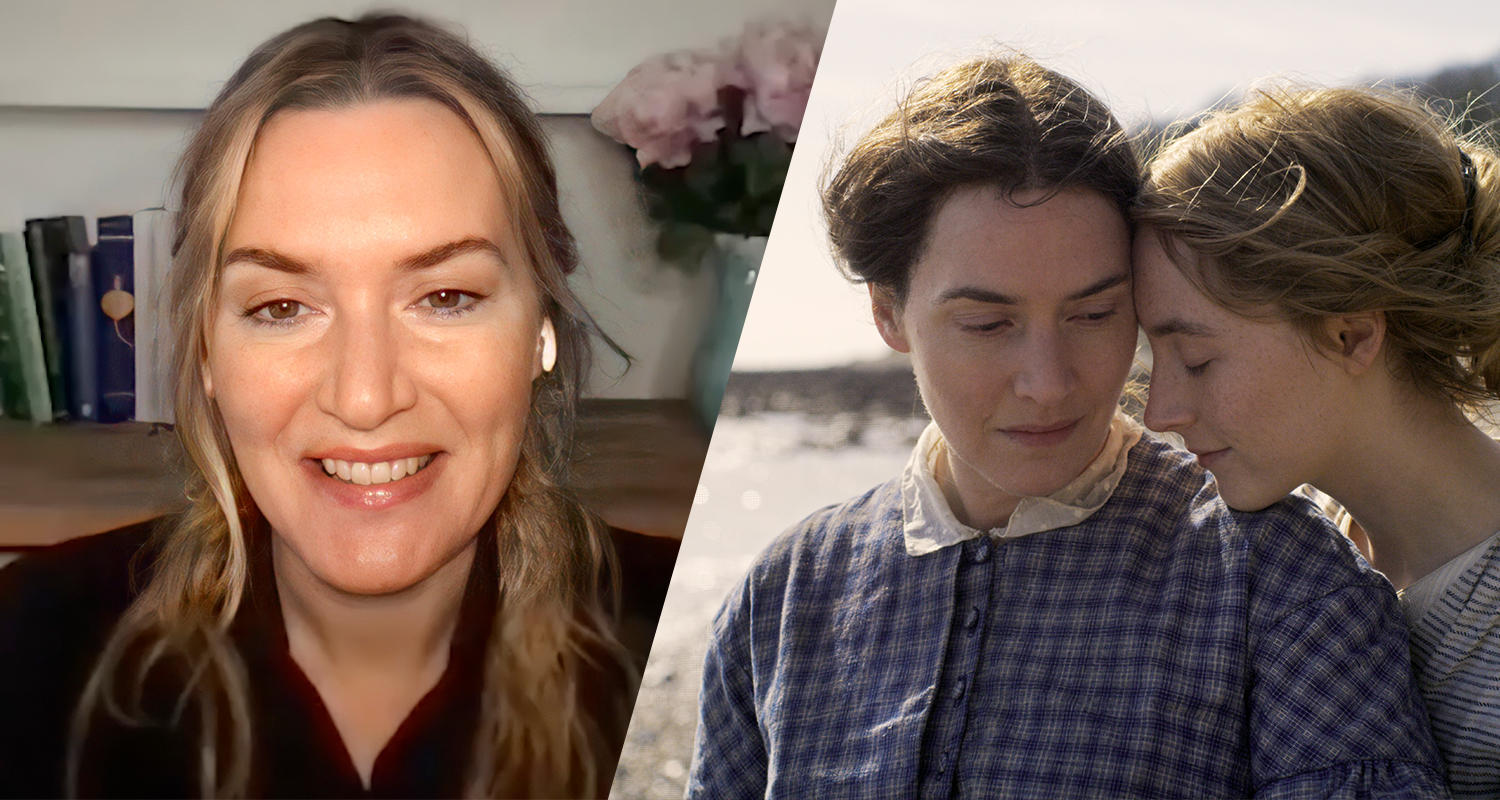Kate Winslet dismisses critics of Ammonite’s fictionalised romance: ‘I love and champion same-sex love stories’
Exclusive: The Oscar-winning star tells Attitude "there would have been no comment" had Francis Lee's powerful romantic drama paired Mary Anning with a male love interest.
By Will Stroude

Words: Will Stroude
Kate Winslet has dismissed critics of Ammonite’s fictionalised romance between 19th paleontologist Mary Anning and socialite Charlotte Murchison, declaring that a lack of historical evidence should not be a barrier to exploring the pair’s sexuality and relationship on screen.
The Oscar-winning star, 45, says that despite there being no historical record of Anning having relationships with either men or women, “there would have been no comment” had Francis Lee’s powerful romantic drama paired her with a male love interest instead of her close friend Murchison (played by Saoirse Ronan).
Ammonite‘s queer take on the life of Anning, whose work uncovering prehistoric fossils along the Jurassic Coast in the early to mid-1800s came amid a revolutionary period of scientific discovery, has ruffled the feathers of many a historical purist, including some of Anning’s distant relatives.
Speaking to Attitude’s Will Stroude ahead of Ammonite‘s release in the UK on digital platforms this Friday (26 March) Winslet says it “should be permissible to explore an alternative love life” for Mary given there is no evidence to suggest the scientific trailblazer was heterosexual.

Saoirse Ronan (left) as Charlotte Murchison and Kate Winslet as Mary Anning in Francis Lee’s Ammonite (Image: Lionsgate)
Asked about those who’ve accused the film of “re-writing history”, Winslet replies: “Well, there is lack of historical evidence, and that is absolutely true. There is no historical evidence whatsoever to suggest she had relationships with men, none. And she was not married.
“So, I think it should be permissible to explore an alternative love life for that individual, to delve into what might have gone on in the inner workings of their heart.”
The star of Titanic and The Reader continues: “And I don’t understand why that matters. I don’t understand what difference it makes to who Mary was and her extraordinary achievements, to pair her with a woman.

Kate Winslet (left) as Mary Anning and Saoirse Ronan as Charlotte Murchison in Francis Lee’s Ammonite (Image: Lionsgate)
“For me, I absolutely love and champion same-sex love stories and any LGBTQ stories that we can possibly get our hands on. And I hope that we are able to normalise same-sex connection on film without hesitation, secrecy or fear, by normalising these relationships.”
Told there would likely have been “no comment” about Ammonite’s historical accuracy had Mary’s romantic interest been male, Winslet replies: “Look, the world has changed. You’re right, there would have been no comment.”
She goes on: “Why does it have to be sensationalised or commented on or criticised in any way? You know, I don’t actually know if it actually has been criticised, because I just don’t read things like that to be honest.
“But what difference does it make? I wasn’t raised like that. That’s not how I was raised.
“What difference does it make? A person’s a person.”
In an exclusive excerpt from the interview in Attitude’s upcoming May issue, out this Wednesday (24 March), Winslet further elucidates on Mary Anning’s characterisation in Ammonite, postulating that a romance with a man wouldn’t have “felt worthy” of an individual who position as a woman in Georgian and Victorian England often saw her work and achievement sidelined.

Kate Winslet as Mary Anning in Francis Lee’s Ammonite (Image: Lionsgate)
” I admired [Francis’] courage I guess in choosing not to pair her with a man, because if he had paired her with a man, somehow given that she was a working-class woman who was very self-taught and loved what she did so much and was so highly-skilled, in a way it almost wouldn’t have felt worthy of her in a funny way, giving her that relationship with a male figure”, says Kate.
“You know, when we see period films, so often they’re upper-class women whose life path is only to bear children and to be married and cared for, usually by a wealthier man. And if it’s a [working class] woman, they’re often a hard-done-by working class individual who doesn’t have to much to say for herself.
“And Mary had so much to say, and still does. The thing that struck me the most was because of the way that the world was in those days, she couldn’t say it – she was prevented from saying it.”
Winslet, who says she jumped at the chance to appear in Ammonite due to her love for Lee’s feature film debut, God’s Own Country, says she hopes that Ammonite’s success as a mainstream period drama will help open to door for a greater diversity of story-telling in cinema.
“What I love about our film is that there’s no shame element around Mary and Charlotte’s relationship: their love for one another isn’t hidden or forbidden in some way, they just love each other”, she says.

Kate Winslet (left) as Mary Anning and Saoirse Ronan as Charlotte Murchison in Francis Lee’s Ammonite (Image: Lionsgate)
“And if we want to bring more LGBTQ stories into the mainstream, then surely by normalising them and removing the elements of shame, we’re hopefully on the right path.”
Winslet adds: “To be able to contribute in hopefully an honest, compassionate and meaningful way, it will make a difference.
“I’ve felt really honoured to hopefully contribute to the evolution and progression of how audience and how LGBTQ people and their relationships are presented on film.”
Watch the full interview below and read more from Kate Winslet in the Attitude May issue, out now to download and to order globally.
Ammonite is available for premium home rental on all digital platforms in the UK from Friday 26 March.
